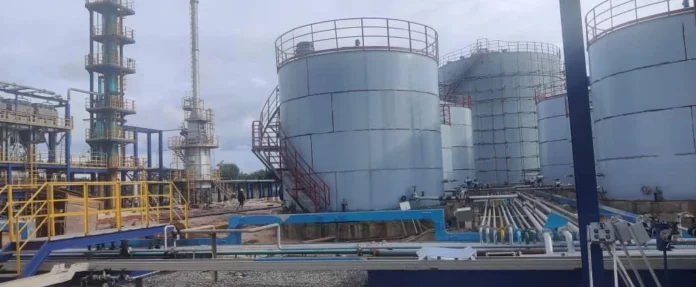In a significant development for Nigeria’s fuel market, petroleum product marketers have lodged formal complaints against the Dangote Refinery over its pricing strategy. The refinery’s recent decision to lower its diesel price to N900 per litre has triggered backlash from marketers who claim the move is harming their businesses.
Devakumar Edwin, Vice President of Dangote Industries Limited, disclosed these concerns during a Twitter Spaces session organized by Nairametrics. According to Edwin, marketers have written to President Bola Tinubu, expressing frustration that the drop in local diesel prices from N1,200 to N1,000 and now to N900 per litre is adversely affecting their operations.
Edwin elaborated on the challenges faced by the Dangote Refinery, which is located in the Lekki Free Zone near Lagos. The refinery is reportedly struggling to sell around 29 tankers of diesel daily due to low patronage from local petroleum importers. This lack of local interest has forced the refinery to export most of its diesel and aviation fuel.
“The local market is not absorbing our products as expected,” Edwin said. “We are compelled to export a significant portion of our diesel and aviation fuel because of this poor local patronage.”
The refinery’s difficulties are compounded by a broader issue of local fuel supply and market dynamics. Edwin noted that despite the refinery’s capacity and efforts, local dealers and the Nigerian National Petroleum Company (NNPC) have not been buying the products in sufficient quantities.
“If the local traders and NNPC continue to avoid our products, we will have no choice but to export them,” Edwin warned. “We have already been exporting aviation fuel and diesel, and we recently began producing petrol. However, if the local market does not support us, we will be forced to export even the petrol.”
Edwin expressed surprise and disappointment at the unexpected challenges faced by the refinery. He recalled that the initial goal of the Dangote Refinery was to add value to Nigeria’s crude oil by refining it locally, thus reducing the country’s reliance on imported refined products.
“Our aim was to refine our crude oil locally, add value, and supply both local and international markets with finished products,” Edwin explained. “However, instead of achieving this goal, we are now facing difficulties in sourcing adequate crude oil locally. We are forced to import crude from the US, Brazil, and other parts of the world.”
This situation reflects a troubling reversal of Nigeria’s longstanding aspiration to become self-sufficient in petroleum refining. Despite decades of efforts to refine and utilise domestic crude oil, Nigeria continues to export raw crude and import refined products.
The Dangote Refinery, with its impressive capacity of 650,000 barrels per day, began its operations with high expectations. It started exporting naphtha in March, followed by low-sulphur straight run fuel oil (LSSR) in May, and commenced domestic sales of diesel and jet fuel in April. In June, the refinery also began exporting diesel fuel meeting European specifications.
However, the current market dynamics have not aligned with the refinery’s objectives. The drop in diesel prices, while intended to be beneficial, has led to unintended consequences for local marketers. These marketers argue that the low prices undermine their business models and create an unstable market environment.

